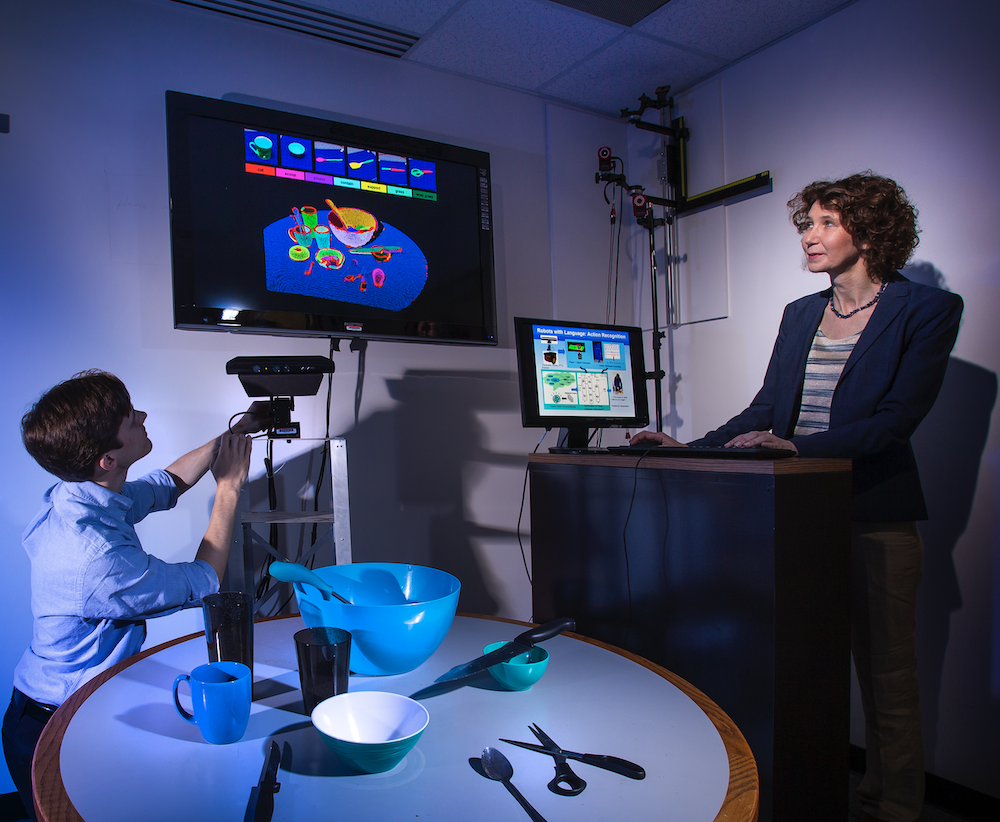
The normal whirlwind of hands-on research activity inside the Brendan Iribe Center for Computer Science and Engineering has come to a screeching halt.
The 215,000-square-foot-facility—home to the Department of Computer Science and the University of Maryland Institute for Advanced Computer Studies (UMIACS)—is empty these days, the result of severe research restrictions that have barred access to the Maryland campus for all but a handful of essential personnel.
While computer science faculty are busy teaching online during the current COVID-19 health crisis, UMIACS researchers—80-plus faculty from eight departments and almost 200 graduate students—are also using online resources to advance research in robotics, computational biology, cybersecurity, and more.
Cornelia Fermüller (right in photo), an associate research scientist in UMIACS, says the biggest challenge for her team has been losing access to specialized hardware in their robotics lab.
Fermüller says her students continue working on their ongoing projects, but that many wish to be back in the lab, “getting their hands on the data and running experiments with the robots in real time.”
An example of her team’s current workaround model involves a robotic hand used to explore how tactile sensing works in active tasks like grasping, pushing and pulling. Without access to their lab that houses a robotic arm they use, the researchers are relegated to analyzing previously collected sensor data and developing models and algorithms in order to understand the robot’s hand movements.
“We’re looking at the sensor characteristics, and modeling the relationship between forces applied to the tactile sensor and its readings,” Fermüller says. “We’re also investigating how to robustly process the tactile data from the sensors in an event-based way.”
Tudor Dumitraș, an associate professor of electrical and computer engineering in the Maryland Cybersecurity Center, says the shift to an all-online environment has made parts of the research process more challenging for his team.
“While we can run the same experiments that we were running before, the disruption has been dramatic, owing to the challenges for teamwork raised by the online environment,” Dumitraș says. “I've significantly lowered my expectations for my group's research productivity this year, and I am very impressed that some of my students are able to stay motivated and can continue making progress.”
Moreover, his team often requires large-scale computational resources to run their analyses, which might become more difficult as a result of the restrictions.
“Normally, the UMIACS tech staff can meet our requirements quickly, but with the restricted access, if we request that new equipment be installed or current equipment upgraded, it may take them a bit longer,” Dumitraș says.
He called this a minor issue, however, saying his group is more concerned with the loss of regular in-person meetings—a “key part of the process” for their research projects.
“Each one of us can bring a new perspective to a problem, so it’s important for us to interact on a regular basis,” Dumitraș says. “This type of brainstorming is much harder to replicate online, although we’re trying.”
The research restrictions have also put a hold on a summer research internship program that Dumitraș has run for the past three years. The program brings up to a dozen top undergraduates from universities overseas, focusing on underrepresented groups like female researchers and students from universities in Eastern Europe.
“The process of preparing those [summer] research projects is a key part of training for my current graduate students, because they have to formulate a project and supervise the interns once they’re here,” Dumitraș says. “The internship program is also a good pipeline for getting top-notch students to apply here for graduate school, and it was a lot of fun.”
Mihai Pop, a professor of computer science and the director of UMIACS, says the loss of onsite access for his lab’s workgroup hasn’t deterred their passion for using computational biology to explore the genetic makeup of microbial communities.
“Most of our work essentially is just sitting on a computer doing analyses of genetic data,” says Pop.
Still, Pop echoes Dumitraș in saying that what has been most taxing is the loss of personal connections.
“The main thing that’s lost is the interaction and being able to just walk up to somebody’s desk and bounce ideas off of them,” Pop says. “Those kinds of informal, personal interactions do add a lot to the graduate student experience, and we’ll work hard to rebuild those activities once we’re back on campus.”
—Story by Colleen Curran